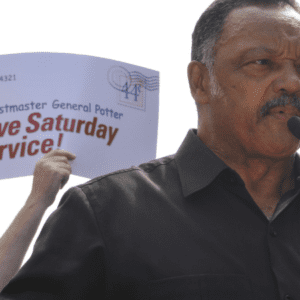October 27, 2009
Congress Must Fix Funding Requirement; USPS Must Expand Goals, Burrus Says
In a follow-up to testimony before a Senate subcommittee, APWU President William Burrus explored alternatives to station-and-branch closures, facility consolidations, and five-day mail delivery — which the Postal Service is proposing in reaction to a severe financial crisis. Burrus urged lawmakers to encourage the USPS to expand its goals.
The Postal Service’s financial difficulties are caused by three major factors, Burrus wrote Oct 23: the requirement to pre-fund retiree healthcare costs; the nation’s economic crisis, and excessive workshare discounts.
“The requirement that the Postal Service fully fund future retiree health benefits over an arbitrary period of time was unwise and unreasonable; it has severely damaged the institution and will continue to do so if it is not corrected,” he wrote. “I ask that Congress permanently correct this colossal mistake by recalculating the future healthcare costs to reflect reality.” In September, Congress authorized a one-year reprieve.
Noting that he is optimistic that Congress will correct the pre-funding debacle and that the economy will eventually rebound, Burrus said, “Excessive discounts also must be eliminated.”
“The American Postal Workers Union has challenged the postmaster general to discontinue the excessive discounts the USPS offers to large mailers, and instead to compensate postal employees for processing letters and flats at a cheaper per-piece rate,” Burrus noted. “This would reduce the Postal Service’s costs; improve efficiency, and make better use of underutilized equipment and employees. As an added incentive, we propose to process parcels at no charge.”
The union president’s comments were in response to written questions posed by Sen. Claire McCaskill (D-MO) and Sen. Tom Coburn (R-OK) following a hearing Aug. 6.
Burrus cautioned that any comprehensive review of the Postal Service should analyze the entire postal system, including private providers of mail services. “To date, all examinations of the mail system have focused on the USPS, with the stated objective of promoting efficiency and eliminating redundancy. The fallacy of this approach is that it artificially limits the definition of the postal network.
“All stakeholders — including postal unions, management, major mailers, private mail consolidators and pre-sorters, transportation providers and suppliers — have a role to play in ensuring the long-term viability of the institution.”
Burrus pledged that “if all postal parties undertake serious steps to enhance the viability of the USPS,” union members would be willing participants.
Burrus was steadfast in opposition to cuts in service, which he said would undermine the institution. “The American Postal Workers Union strenuously opposes a reduction in the number of delivery days, because we believe it would lead to the demise of the Postal Service,” he said. “Eliminating Saturday delivery would enhance privatization and undercut the Postal Service’s ability to serve citizens and businesses. In the long run, it would undermine universal service at uniform rates.
“It is doubtful Congress would dictate that mail cannot be delivered on Saturdays,” he explained; “more than likely, legislation would simply abolish the Postal Service’s obligation to deliver on the sixth day. Private companies would welcome the opportunity to deliver mail on Saturdays — in some locations — and the march to privatization would begin.”
Regarding the closure of postal facilities, the union president wrote, “Existing law limits the right of the Postal Service to close post offices solely because they operate at a deficit, noting that it is the specific intent of Congress to ensure that effective postal services be provided to residents of both urban and rural communities. The APWU supports Congress’ intent, and we believe the USPS has sufficient flexibility to optimize its operations.”
Burrus said the USPS lacks a viable business plan, and urged postal executives to expand their goals. Instead of acting as a “passive conveyer” of messages, the Postal Service should act as a catalyst that encourages and aids hard-copy communication.
Commenting on Sen. Coburn’s request that he set aside concerns about the retiree pre-funding requirement while evaluating the business plan, Burrus said, “It is akin to asking if an individual has a plan for crossing the street after being hit by a car.”



